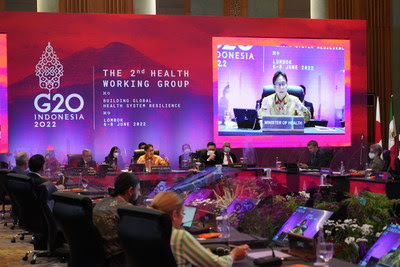LOMBOK, Indonésie, 9 juin 2022/PRNewswire/ — La deuxième réunion du groupe de travail sur la santé (HWG) du G20 a réuni des dirigeants du monde pour lancer un nouveau fonds mondial d’urgence pour les futures pandémies et a mis l’accent sur la nécessité de mieux partager les données de séquençage génomique, ainsi que sur le fonctionnement du Fonds intermédiaire de financement (FIF) sous l’égide de la Banque mondiale pour se préparer aux futures pandémies.

Le ministre de la Santé indonésien, Budi Gunadi Sadikin, a encouragé les États membres du G20 à ne pas laisser la pandémie progresser sans en tirer de précieuses leçons.
« Ce n’est que par de grands tremblements de terre que s’élèvent de hautes montagnes. Je crois que c’est vrai, non seulement pour les volcans, mais aussi pour notre humanité. Chaque crise crée de grandes occasions », a-t-il déclaré à Lombok, aux Petites îles de la Sonde occidentales, en Indonésie.
Les principales questions abordées lors de la réunion qui s’est déroulée du 6 au 8 juin 2022 avaient trait à la mobilisation de ressources financières pour les futures interventions en cas de pandémie.
Les États membres du G20 ont discuté des leçons à tirer des succès des initiatives de contre-mesures médicales, telles que COVAX et les accélérateurs ACT qui ont fonctionné efficacement pendant la pandémie pour introduire les vaccins, les traitements et les diagnostics.
Le G20 et ses partenaires, tels que le GISAID, cherchent désormais à optimiser la surveillance génomique et le partage de données fiables pour permettre au monde d’identifier rapidement de nouveaux pathogènes qui pourraient représenter de nouvelles menaces pour la sécurité sanitaire mondiale.
« Nous avons besoin d’une plateforme de coordination plus permanente qui puisse traiter les cinq points essentiels que sont l’accès aux contre-mesures, la coordination d’urgence, le renseignement collaboratif, la protection communautaire et les soins cliniques aux patients dans le besoin », a déclaré le ministre de la Santé.
L’Indonésie s’est engagée à verser 50 millions de dollars américains au FIF. Dans le cadre de son mandat à la présidence du G20, l’Indonésie exercera également des pressions sur les organisations et les donateurs pour s’assurer que le fonds profite aux pays cibles identifiés afin de prévenir les conflits d’intérêts avec les donateurs et les organisations.
Le docteur Tedros Adhanom Ghebreyesus, Secrétaire général de l’OMS, a été félicité par la présidence indonésienne pour avoir donné la priorité à l’établissement d’une architecture d’un système de santé mondial et l’avoir mis à l’ordre du jour du G20.
« Nous devons tirer les leçons de cette pandémie, car ce ne sera pas la dernière », a déclaré le docteur Tedros.
Pour visionner la cérémonie d’ouverture de la plénière du groupe de travail sur la santé et la conférence de presse, consultez https://www.youtube.com/c/
Photo – https://mma.prnewswire.com/
